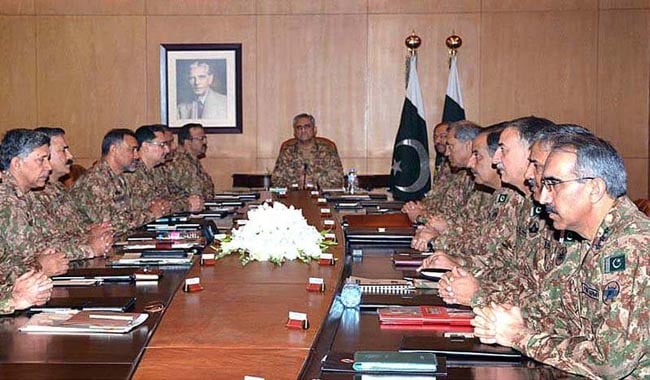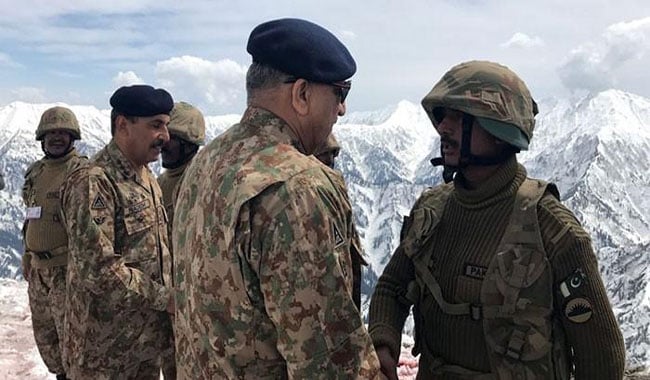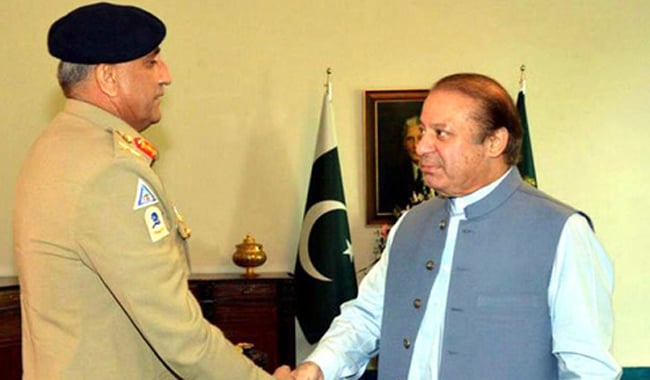The Bajwa Doctrine: from chauvinism to realism
After 70 years of extreme chauvinism, we are finally into the doctrine of realism which focuses on the peaceful coexistence with the neighbouring countries.
The Bajwa Doctrine, initiated by the rationalistic and logical Gen Qamar Bajwa and his equally able team of the top military command, is all about realising the changes taking place around the country and reshaping policies according to the needs of the modern times.
The doctrine is very clear about the democratic future of the country. Believing in the importance of the constitution, the doctrine wants to ensure the proper respect of all the institutions of the state. The years of collective experience of the military have proved that the supremacy of law is a major deterrent against terrorism.
It is a considered view of the command that the capacity of civilian institutions like Police, Civil Services and civil intelligence agencies needs to be enhanced for strengthening the country.
International Vision:
It was very courageous on the part of Gen Bajwa to tell the Afghan authorities in unequivocal terms that Pakistan has no expansionist designs about Afghanistan. This doctrine openly abandoned the idea (if it ever existed) of strategic depth and Afghanistan as the fifth province of Pakistan. The Bajwa Doctrine seeks total peace on western borders and wants to make Iran and Afghanistan as its erstwhile allies. Gen Bajwa has tried to rekindle the deep friendship with Saudi Arabia, Qatar and the USA who were unhappy with the Nawaz government for different reasons. Some successful moves of strategic cooperation have again befriended these estranged countries who at times have conflicting interests with each other.
The Bajwa Doctrine is not about the role of a hateful neighbour trying to destabilise others but establishing Pakistan as a proud peace-loving country which wants peaceful coexistence with the world. But if provoked, threatened or pressurised it will show its full muscle power to the enemy to prove its strong commitment to the motherland.
About India on the eastern border, the doctrine understands that there can be no war between two neighbouring nuclear countries. It thinks that India though stubborn for the time being because of extremist Modi regime but within two to three years due to its growing economy will realise the need of a peace dialogue with Pakistan. The doctrine till then will continue its wait and see policy about India. The doctrine continues its engagement policy with the USA but this time Pakistan is not ready to be involved in the infighting within Afghanistan.
Counter-terrorism strategy:
The Bajwa Doctrine focuses on the internal security and believes in totally wiping out terrorism from Pakistan. It is making sure that no safe havens be spared for the terrorists. The doctrine’s only priority is Pakistan. The old idea of distinguishing between good or bad Taliban seems to have died down. The doctrine has fought against terrorism of every hue and colour. Gen Bajwa and his team has a clear vision of peaceful and prosperous Pakistan and they want to make Pakistan totally violence free. They want the militant groups to be de-weaponised and brought to the mainstream like Ireland and other strife-stricken countries where warring groups were dealt in an ideal way.
Gen Bajwa had met Afghan President Ashraf Ghani and told him that as a first step both, Afghanistan and Pakistan should stop being used against each other. The border fencing on the Pak Afghan border is the hallmark achievement of the Bajwa Doctrine which will benefit both the neighbours.
The Bajwa doctrine stands for regional peace and, like China, wants to make peace with India while keeping our differences on core issues. The doctrine is ready for peaceful negotiations but without compromising on the Kashmir issue. The doctrine is fully aware of the Chinese advice to Pakistan that instead of war, other peaceful measure be negotiated for Kashmir issue.
The Bajwa doctrine is fully aware of the international perspective since the general himself had been in UN Peacekeeping Force interacting with different nationalities. The doctrine analysed the USA-Canada business relationship and reached to the conclusion that initially Canada was at loss but now it’s in profit. This example can help Pakistan to develop trade with China and India taking care of our own business interests.
The doctrine wants good relationship with the USA and is ready to work with them on the controversial issues. The vision negates any idea of direct or indirect war with former ally USA and stresses the need of resolving all issues through dialogue.
The doctrine has painstakingly worked on improving relationship with Iran and Gen Bajwa’s visit to Iran and Iranian foreign minister Jawad Zarif’s visit to Pakistan are being considered as very fruitful. The Bajwa Doctrine has successfully mended the damage done to Pak-Saudi relations during the last regime of Nawaz Sharif. It has also normalised the relations with UAE which seemed to be at loggerheads during the Sharif regime because of the issue of voting for Turkey instead of UAE for EXPO 2020.
Roots of the Command:
Gen Bajwa, though a continuation of the superb military leadership who are professionally trained to the perfection, yet like US President Woodrow Wilson who gave the idea of the League of the Nations for the peaceful world after the Second World War, Gen Bajwa is a brave commander ready to fight against every enemy but at the same time he is kind at heart who wants to see this world peaceful.
Political Vision:
Like all great setups, the doctrine has certain flaws as well. The doctrine is gullible on some hot and controversial issues. The love of the institution makes it gullible.
The doctrine sometimes believes in the raw stories presented to it by its own intelligence system. Despite these usual flaws, the Bajwa doctrine is sure that the Panama JIT was totally unbiased. It is also dead sure that no pressure was exerted on the judiciary by any agency.
So Bajwa doctrine clearly says that army had no direct role in politics and it takes exception to mention of army in ousting Nawaz Sharif. This doctrine is of the view that Panama descended upon Nawaz Sharif accidentally and army did not play any role in the court decision against him. Rather Gen Bajwa told PM Nawaz Sharif soon after becoming COAS that he will stand by the government except in the Panama case. The unauthentic journalistic feel is that about 70 per cent of Panama material was provided by the dear and near ones of Nawaz Sharif while only 30 per cent was collected by JIT itself.
The doctrine fully knows that some states had their own complaints against Sharifs so they also wilfully provided proof against them. Recently, the UK has also sent money laundering report of the Sharif family.
Gen Bajwa even wanted to write to the Supreme Court of Pakistan to exclude military men from JIT. He, however, did not do so on the pretext that the Supreme Court might consider it as an effort to jeopardise the proceedings of the court.
The Bajwa Doctrine has wilfully taken a soft look and it does not want to repeat the cruelties committed during the Zia regime. The doctrine has to retreat on certain issues like creating forward bloc because it strictly avoided using brutal force. The doctrine is so soft that when Nawaz Sharif complained to the army chief that a brigadier in Panama JIT was harsh with Mian Tariq Shafi, he personally made sure that this type of complaint is never repeated. The general feeling in the establishment is that 18th Amendment has become a major cause of unbalance between Federation and the provinces. The provinces do not have the capacity to handle Higher Education Commission and nor do have the means to deal with law and order. The doctrine will be happy to do away with 18th Amendment to which it sees more dangerous than six points of Sheikh Mujeeb. The perception is that the amendment has changed Pakistan from a Federation to confederation.
The doctrine has strong commitment to democracy but the “soft spoken Bajwa” would not like to be remembered as Nero playing flute when Rome was on fire. Gen Bajwa was in a position to impose the martial law on the eve of Khadim Rizvi Dharna when attacks were being carried out on the houses of N leaders but he did not go for this option because of his commitment to democracy.
The doctrine stands by the Supreme Court and other institutions and is bound by Article 68 of the constitution to do this. Any effort to subvert the working of the institutions would mean that redlines has been be crossed.
Financial Management:
The professionals of the Bajwa doctrine totally reject Ishaq Dar’s financial vision and feels he damaged the state by his policies. The doctrine is however happy with new chap Miftah Ismail and his financial vision. The analysts believe that the financial management of Zardari despite oil crisis was better than the Sharifs. Zardari enhanced the exports while Dar failed miserably due to artificially holding dollar price under strict control. The doctrine is more interested in imposing financial and educational emergency rather than wasting money on Metros and Motorways. The doctrine is also unhappy on throwing away 120 billion rupees in the name of Benazir Income Support Program and would like to convert this huge fund to some purposeful means.
Historic roots:
Pakistan Army is much above caste and creed or ethnic and religious divides and all selections are done much above these relationships.
Gen Bajwa, if seen in the continuation of Pakistani perspective, is the first Jat son of the soil who has been given military command of the army in the 70 years of national history. It was 170 years earlier when the last native son of the soil, another Jat of the Sindhu clan, Gen Sher Singh Attariwalla, fought valiantly at the battlefield of Chillianwala, District Gujrat – the same district Gen Bajwa’s Warraich mother belonged to. The battle of Chillianwala was the only war won against the British in 100 years of colonial history of this land.
Quite interestingly, though Gen Sher Singh was the commander of Sikh army, 1,500 Afghan Muslims warriors led by Dost Muhammad Khan were also part of his force. Later, Gen Sher Singh had to surrender like the last Mughal king, Bahadar Shah Zafar, or like the French hero, Napoleon Bonaparte. Gen Sher Singh met the same fate as of abovementioned great heroes and remained exiled to Banaras till his last breath.
Gen Bajwa, the 16th commander of Pakistan Army, belongs to the 62nd course.
The whole world knows that the selection process in the army is purely merit based. The appointment of 16 army chiefs in the last 70 years shows the regional and ethnic diversity of military leadership. Coming from different areas, distant places and diverse communities, they represent the institution like a single unit. It is interesting to go through the chiefs’ native districts and their respective clans to prove the diversity within the military. The list of Pakistan’s army chiefs along with their native districts and their respective clans is as follows:
Gen Gracey (British), Field Marshal Ayub Khan (Tareen Pathan from Hazara district ), Agha Yahya Khan (Pathan/ Qazilbash) , Gen Gul Hassan (Pathan), Gen Tikka Khan (Rajput from Rawalpindi), Gen Ziaul Haq (Arain from district Jalandhar), Gen Aslam Baig (Urdu speaking from Karachi), Gen Asif Nawaz (Janjua Rajput from Jhelum), Gen Waheed Kakar (Kakar Pathan from KP) , Gen Jehangir Karamat (Kakkizai from Lahore), Gen Pervez Musharraf (Urdu speaking Syed from Delhi settled in Karachi), Gen Ashfaq Pervez (Kiyani from Gujar Khan, Rawalpindi), Gen Raheel Sharif (Kashmiri Rajput from district Gujrat) and finally Gen Qamar Bajwa (Jat from Gujranwala).
Gen Kayani was a chain-smoking philosopher general who was best to the minutest details, while Gen Raheel was more concerned about his image making rather than merely focusing on his professional work. Gen Kayani prepared the army for anti-terrorism narrative and successfully transformed the troops from jihadi mindset to the national narrative. Gen Raheel asserted his role as against the civilian rule but by the end of his career he did not leave his lasting effect on army and the country. In contrast, Gen Bajwa is totally at ease with himself, no pomp and show, humble and human. No fake pride and no tall claims.
He has no pretensions of being philosophical or having deep wisdom. He has no wish of false image making. He is not interested in any conspiracy to take the reins of power. He wants to retire at the end of his tenure and will not seek any extension. He is making no effort to become the greatest general or the field marshal of this country because he is contented on what he has already got.
He is neither stiff necked and robotic like Raheel and nor unpredictable and deep thinking like Gen Kayani. He is sociable and close to the realities of life and wants to resolve the issues by actions in the right direction. Above all, this doctrine is ready to listen and learn from its mistakes. The general himself like Gen Musharraf is a patient listener and appreciative of rational thinking. He is warm during socialising and takes deep and affectionate interest in intrinsic human relationships.
The success of any doctrine is not measured by intentions but by the results. The history will judge this doctrine as the others were judged by the deliverance. It is common practice that the people in power forget their main focus and spend most the time on trivialities. Securing Pakistan from external threats, transforming the fictional state narrative closer to the facts and strengthening political and economic system are the needs of present times. Let see whether the doctrine passes the test of time or not.
-
 Paul McCartney Talks 'very Emotional' Footage Of Late Wife Linda In New Doc
Paul McCartney Talks 'very Emotional' Footage Of Late Wife Linda In New Doc -
 Princess Beatrice, Princess Eugenie's Response To Andrew's Arrest Revealed
Princess Beatrice, Princess Eugenie's Response To Andrew's Arrest Revealed -
 King Charles And Princess Anne Bestow Honours At Windsor Castle
King Charles And Princess Anne Bestow Honours At Windsor Castle -
 King Charles 'worried' As Buckingham Palace, Royal Family Facing 'biggest Crisis'
King Charles 'worried' As Buckingham Palace, Royal Family Facing 'biggest Crisis' -
 Milo Ventimiglia Recalls First Meeting With Arielle Kebbel On The Sets Of 'Gilmore Girls' Amid New Project
Milo Ventimiglia Recalls First Meeting With Arielle Kebbel On The Sets Of 'Gilmore Girls' Amid New Project -
 Eric Dane Infuriated After ALS Diagnosis As He Feared The Disease Would Take Him Away From His Girls
Eric Dane Infuriated After ALS Diagnosis As He Feared The Disease Would Take Him Away From His Girls -
 It's A Boy! Luke Combs, Wife Nicole Welcome Third Child
It's A Boy! Luke Combs, Wife Nicole Welcome Third Child -
 Leading Astrophysicist Shot Dead At Southern California Home
Leading Astrophysicist Shot Dead At Southern California Home -
 Johnny Depp's Kind Gesture Towards Late 'Grey's Anatomy' Actor Eric Dane Before Death Laid Bare
Johnny Depp's Kind Gesture Towards Late 'Grey's Anatomy' Actor Eric Dane Before Death Laid Bare -
 How Princess Eugenie, Beatrice React To Andrew Arrest?
How Princess Eugenie, Beatrice React To Andrew Arrest? -
 Kylie Jenner 'convinced' Gwyneth Paltrow Is 'crushing' On Timothee Chalamet: 'It's Disrespectful'
Kylie Jenner 'convinced' Gwyneth Paltrow Is 'crushing' On Timothee Chalamet: 'It's Disrespectful' -
 Gemma Chan Reflects On 'difficult Subject Matter' Portrayed In 'Josephine'
Gemma Chan Reflects On 'difficult Subject Matter' Portrayed In 'Josephine' -
 Blood Falls In Antarctica? What Causes The Mysterious Red Waterfall Hidden In Ice
Blood Falls In Antarctica? What Causes The Mysterious Red Waterfall Hidden In Ice -
 AI Power Play: Nvidia Moves To Invest $30 Billion In OpenAI
AI Power Play: Nvidia Moves To Invest $30 Billion In OpenAI -
 Will Savannah Guthrie Ever Return To 'Today' Show? Here's What Insiders Predict
Will Savannah Guthrie Ever Return To 'Today' Show? Here's What Insiders Predict -
 Andrew Mountbatten-Windsor In A Fix Over New Disturbing TMZ Photos
Andrew Mountbatten-Windsor In A Fix Over New Disturbing TMZ Photos






